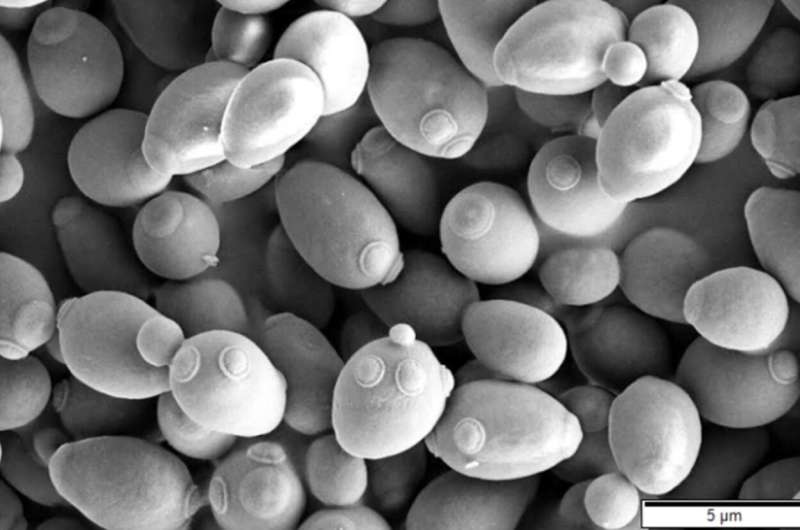This article has been reviewed according to Science X's editorial process and policies. Editors have highlighted the following attributes while ensuring the content's credibility:
fact-checked
peer-reviewed publication
trusted source
proofread
Yeasts as triggers of altered immune responses in inflammatory bowel disease

Chronic bowel inflammation is based on an excessive or misdirected inflammatory reaction. Experts assume that the immune system also reacts incorrectly to microorganisms in the intestine that do not cause an inflammatory immune reaction in a healthy state. But which microorganisms trigger this immune response and how exactly the immune cells react is still largely unknown.
Now, researchers from the Cluster of Excellence "Precision Medicine in Chronic Inflammation" (PMI) have discovered that yeast fungi could play an important role in this. The researchers from the Faculty of Medicine at Kiel University (CAU) and the University Hospital Schleswig-Holstein (UKSH), Campus Kiel, have published their findings in Nature Medicine.
Trillions of microorganisms colonize the human body, especially the intestine. This microbiome consists mainly of viruses and bacteria, but to a lesser extent also of fungi. Microorganisms live in symbiosis with the human organism and are essential for it to work healthily. The immune system has the important and at the same time difficult task of interacting with the microbiome, i.e. tolerating the microbes living there but also keeping them in check.
However, according to current research, this interaction is disturbed in Crohn's disease, a chronic inflammatory bowel disease where the immune cells react too strongly to certain components in the microbiome—inflammation in the gut flares up again and again. Those affected suffer from pain, diarrhea, fever and other symptoms. It is estimated that one in 500 people in Germany is affected.
Yeast fungi as an inflammation trigger
T cells play an important role in the impaired immune tolerance in Crohn's disease. These immune cells recognize a part of a microbe, a so-called antigen, very specifically via a T-cell receptor on their surface and respond to it with a corresponding immune response.
"We wanted to find out which microbes trigger an altered T-cell response in Crohn's disease," explains the first author of the paper, Gabriela Rios Martini, a doctoral candidate in Professor Petra Bacher's research group at the Institute of Immunology and the Institute of Clinical Molecular Biology, CAU and UKSH.
To do this, the team looked at the response of certain T cells to different microbes in blood and tissue samples from patients compared to healthy people. "First we looked at the reaction to certain bacteria, as these make up a large part of the microbiome, but we couldn't find any differences between sick and healthy people with the species we have studied so far," Rios Martini continues.
"But then we looked at the T-cell responses to yeast fungi, such as various Candida or Saccharomyces species, and surprisingly found a massively increased T-cell response in Crohn's disease patients." The researchers investigated the reaction to both yeasts that are part of the natural, healthy microbiome and yeasts that enter the intestine primarily through food.
Cross-reactivity: T cells react to many different yeast fungi
In order to learn more about the functional properties of the T cells and also to investigate the T-cell receptors, the researchers sequenced the T cells reacting against the yeast fungi. Bacher and her team thus established that in patients there are mainly T cells whose T-cell receptors can react against many different Candida and Saccharomyces species.
"Apparently, the T cells specifically recognize a certain part in these related yeast fungi that is present in many of the species studied," explains lead senior author Professor Petra Bacher from the Institute of Immunology and the Institute of Clinical Molecular Biology, CAU and UKSH.
"This means that the T cells do not only react to a specific yeast species, but can be activated by many different Candida and Saccharomyces yeasts," Bacher continues. In what is known as cross-reactivity, Bacher and her team also see an explanation why the yeast-specific T cells could contribute to the chronic inflammatory reaction.
"Overall, our data suggests that after an initial T-cell response against yeast, repeated contact with antigens found in multiple yeasts leads to activation and proliferation of cross-reactive T cells. So the immune response is probably triggered again and again, which most likely also contributes to the chronicity of the inflammation," says Bacher. In addition to the so-called commensal yeast fungi living in the intestine, yeasts ingested daily from food could also play a role.
Investigating new therapeutic approaches for Crohn's disease in the future
"The findings will also lead to possible new therapeutic approaches," says Professor Stefan Schreiber, spokesperson of the Cluster of Excellence PMI and Director of the Department of Internal Medicine I, UKSH, Campus Kiel, and the Institute of Clinical Molecular Biology, CAU and UKSH, Campus Kiel, who collaborated on conducting the study.
"The findings help us to better understand the developmental mechanisms of chronic inflammatory bowel diseases such as Crohn's disease. Yeast fungi have received far too little attention in this context so far. For the first time, we have identified strong evidence for the involvement of yeast-reactive T cells in the inflammatory response in Crohn's disease. More research is now needed to determine their direct contribution to the pathophysiology of the disease," says Schreiber.
In further studies, the researchers now want to investigate the effect of eliminating yeasts from the diet or eliminating yeast fungi in the gut through anti-fungal therapy. Another approach would be to specifically disable the cross-reactive yeast-specific T cells through cellular therapies. These further studies will clarify whether potential future therapies that directly target the yeast fungi in the gut or yeast-specific T cells are also clinically effective, according to the research team.
More information: Gabriela Rios Martini et al, Selection of cross-reactive T cells by commensal and food-derived yeasts drives cytotoxic TH1 cell responses in Crohn's disease, Nature Medicine (2023). DOI: 10.1038/s41591-023-02556-5



















